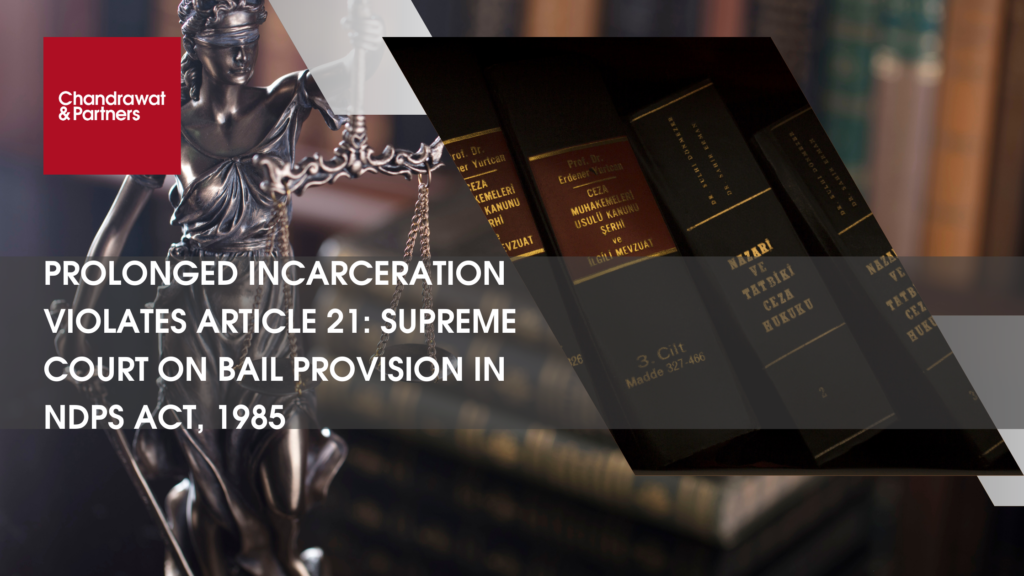
Share :
OVERVIEW
Article 21 of the Constitution of India, 1949 prohibits arbitrary and unlawful detention, ensuring that no person can be detained without proper legal justification or without following due process of law. It stated that a person cannot be deprived of their right to life and liberty, except in accordance with the law. Acknowledging this right under the Constitution, in the recent case of Ankur Chaudhary vs. State Of Madhya Pradesh,the Supreme Court granted bail to the accused due to an unjustified delay in trial resulting in prolonged incarceration. Such delays can serve as grounds for bail under the Narcotic Drugs and Psychotropic Substances Act, 1985 (the “Act”), notwithstanding the strict provisions of Section 37 of the Act.
CASE BACKGROUND
The accused is a permanent resident of District Meerut (U.P.) and the sole breadwinner for his family. The accused had been in custody for more than two years, in connection with an offence punishable under Section 8 read with Section 22 and 29 of the Act. Despite the extended period, the trail had not been concluded.
The accused was implicated based on a co-accused’s memorandum statement, which is not legally admissible. The accused claimed that the Panch witness who appeared before the trial court did not support the prosecution’s case. The prosecution claimed that bail could not be granted since the Investigation Officer had not been interrogated as a Panch witness.
The State opposed the bail application, stating that the applicant’s initial bail application was denied on merit after examining all of the facts and circumstances of the case. As a result, the State asserted that the accused does not deserve bail.
LEGAL APPLICATION
- Section 24of the Act states provisions of the external dealings of narcotics drugs and psychotropic substances.
- Section 27Aof the Act discussed financing of illicit drug traffic and harboring offenders along with offences that involve commercial quantities shall be released on bail, only on two conditions:
- Where the public prosecutor has got the opportunity to oppose the application for release and
- The court is satisfied that there are reasonable grounds to believe that the accused is not guilty of the aforementioned offences and that he is not likely to commit such offences while on bail.
- Section 37 of the Act states that offences to be cognizable and non-bailable. It states that bail should not be granted unless the accused satisfies two conditions:
- There are reasonable grounds for believing that the accused is not guilty of such an offence.
- The accused is not likely to commit any offence while on bail.
JUDICIAL PRECEDENTS
In the notable cases,Mohd. Muslim v. State (NCT of Delhi), the Supreme Court addressed bail applications involving offences under the Act. The Court emphasized that prolonged incarceration could override the statutory restrictions outlined in Section 37 of the Act. This precedent established that undue delays in trials could warrant granting bail to accused individuals, despite the stringent provisions of the
ANALYSIS OF BAIL UNDER THE ACT
Considerations while granting bail in NDPS proceedings-
1.Nature and Quantity of Drugs: The courts consider both the gravity of the offence and the quantity of drugs involved. In situations involving tiny amounts of narcotics for personal usage, bail may be granted more readily.
- Part of the Accused: The court considers the accused’s part and involvement in the alleged offence. If there is no compelling evidence tying the accused to drug trafficking or manufacturing, bail may be offered.
3.Antecedents and Criminal History: The accused’s previous criminal history is also considered. A history of drug-related offences or criminal activity may have an undesirable influence on the bail decision.
4.Possibility of Tampering with Evidence or Influencing Witnesses: The court determines whether releasing the accused on bail will impede the investigation or increase the danger of tampering with evidence or influencing witnesses.
Grounds for Cancellation of Bail:
- Where the accused misuses his liberty by indulging in similar criminal activity,
- Interferes with the course of investigation,
- Attempts to tamper with evidence or witnesses,
- Likelihood of fleeing, etc.
END REMARK
According to the Supreme Court’s verdict, prolonged detention owing to unjustified trial delays violates the fundamental right to life and personal liberty under Article 21 of the Constitution. This case demonstrates that even restrictive laws such as Section 37 of the Act, cannot supersede the Fundamental Rights protected by the Constitution. It emphasizes the necessity of timely trials and the judiciary’s responsibility in ensuring that persons are not unfairly denied their liberty.
For more information or queries, please email us at
enquiries@chandrawatpartners.com



